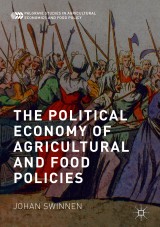Details

The Political Economy of Agricultural and Food Policies
Palgrave Studies in Agricultural Economics and Food Policy
|
CHF 153.50 |
|
| Verlag: | Palgrave Macmillan |
| Format: | |
| Veröffentl.: | 24.05.2018 |
| ISBN/EAN: | 9781137501028 |
| Sprache: | englisch |
Dieses eBook enthält ein Wasserzeichen.
Beschreibungen
<div><b>Winner of the European Association of Agricultural Economists Book Award</b><br></div><div><br></div>Food and agriculture have been subject to heavy-handed government interventions throughout much of history and across the globe, both in developing and in developed countries. Today, more than half a trillion US dollars are spent by some governments to support farmers, while other governments impose regulations and taxes that hurt farmers. Some policies, such as price regulations and tariffs, distribute income but reduce total welfare by introducing economic distortions. Other policies, such as public investments in research, food standards, or land reforms, may increase total welfare, but these policies come also with distributional effects. These distributional effects influence the preferences of interest groups and in turn influence policy decisions. Political considerations are therefore crucial to understand how agricultural and food policies are determined, to identify the constraints within which welfare-enhancing reforms are possible (or not), and finally to understand how coalitions can be created to stimulate growth and reduce poverty.
<div>1. Introduction.- 2. Political Coalitions in Agricultural and Food Policies.- 3. Factors Influencing Policy Choices.- 4. The Development Paradox.- 5. Anti-trade Bias and the Political Economy of Instrument Choice.- 6. Development Paradox and Anti-trade Bias Revisited?.- 7. Policy Reforms in History: Europe, the United States, and China.- 8. Price Volatility.- 9. Crises and Development Policies.- 10. Food Standards.- 11. Public Investment in Agricultural Research.- 12. Land and Institutional Reforms.- 13. Policy Interactions. </div>
<p>Johan Swinnen is Professor of Economics and Director of the LICOS-Centre for Institutions and Economic Performance at the University of Leuven, Belgium. He is also Senior Research Fellow at the Centre for European Policy Studies (CEPS) in Brussels, a part-time Visiting Professor at the Centre for Food Security and the Environment at Stanford University, USA, and Mercator Fellow at the University of Gottingen, Germany. Swinnen has previously served as President of the International Association of Agricultural Economists, Lead Economist at the World Bank, and Economic Advisor at the European Commission. <br></p>
Food and agriculture have been subject to heavy-handed government interventions throughout much of history and across the globe, both in developing and in developed countries. Today, more than half a trillion US dollars are spent by some governments to support farmers, while other governments impose regulations and taxes that hurt farmers. Some policies, such as price regulations and tariffs, distribute income but reduce total welfare by introducing economic distortions. Other policies, such as public investments in research, food standards, or land reforms, may increase total welfare, but these policies come also with distributional effects. These distributional effects influence the preferences of interest groups and in turn influence policy decisions. Political considerations are therefore crucial to understand how agricultural and food policies are determined, to identify the constraints within which welfare-enhancing reforms are possible (or not), and finally to understand how coalitions can be created to stimulate growth and reduce poverty.
Offers an elegant yet accessible introduction to the political economy of agricultural economics and food policies Presents both theoretical arguments and empirical evidence Documents major changes and variations in agricultural and food policies Blends a firm analytical grasp of welfare economics principles with a nuanced understanding of how ideology drives political economy Emphasizes the importance of interactions between institutions and economic and political forces
Diese Produkte könnten Sie auch interessieren:

Integration, Growth, and Cohesion in an Enlarged European Union

von: John Bradley, George G. Petrakos, Julia Traistaru

CHF 177.00

Rethinking Regional Innovation and Change: Path Dependency or Regional Breakthrough

von: Gerhard Fuchs, Philip Shapira

CHF 177.00














